- Home
- Jerry Spinelli
Love, Stargirl Page 6
Love, Stargirl Read online
Page 6
Does it make you wonder, Leo? Someday in the far future, when the Milky Way has turned another cosmic click, will someone carry a chair to your grave site and keep you company forever? Can you imagine someone loving you that much? Can I?
And I’m thinking maybe I did the donut thing all wrong. How was he supposed to know what was in the bag? Or that the donuts were for him? He probably thought it was just litter and in the name of Grace booted it away.
So this time I’ll do it differently. I got a small white wicker basket. I put in three donuts. I covered the donuts with plastic wrap so he could see what was there. I’ll sneak out early tomorrow morning, à la Dootsie, while it’s still dark, and leave the basket by the tombstone.
June 16
He took it!
I rode to the cemetery this afternoon. I was nervous. I pedaled around behind him. I kept my distance. At first I didn’t see it. Then I changed my angle—and there it was, the white basket, sitting in the grass beside his foot. He was nodding off, his chin in his chest. I was so happy I gave a little “Yippee!” as I pedaled away.
June 18
Here’s the new ad I put in the Morning Lenape today. I don’t know if he reads the paper. I decided it would be safer not to use names:
Every day he visits her,
talks with her,
sleeps with her.
June 21
Summer Solstice.
When you woke up this morning, dear Leo, the sun was directly above the Tropic of Cancer. You will never find it any farther north. This is the longest day of the year. From now until the Winter Solstice on December 21, each day will be a few minutes shorter than the one before. Today is the official beginning of summer.
In other words, it’s a holiday. Not a people holiday—a natural holiday. And who wants to celebrate a holiday alone? And since you’re not here, I thought: OK—Dootsie.
When I told her about it last week, the first thing she said was, “Let’s get dressed up!” Amazing how this little kid is always one step ahead of me. We went to my mother’s workroom. My mother dove into the remnant pile of her recent costume-making jobs, stitched together some pieces, and voilà: Dootsie looking like she flew through a rainbow. As for me, I got out the buttercup dress I wore to the Ocotillo Ball. (You remember, don’t you? The ball you didn’t ask me to.)
I decided to do it, naturally enough, on Enchanted Hill. Dootsie stayed over at my house last night. My mother had told her parents what I had in mind. They had no problem with Dootsie sleeping over, but they were a little shaky on her going outside while it was still dark, even for such a short distance, even with me. So my mother volunteered my father.
“He’ll drive them in the milk truck,” she told them.
“Won’t he be late for work?” they said.
“It happens now and then,” she said. “The customers understand. Acts of God and nature. Snow. Ice. Crazy daughter.”
“Okay,” they said.
Dootsie was limp as a rag doll when I dressed her at 4:30 a.m. As usual, my mother came down to the porch, walkie-talkie in the pocket of her bathrobe. Turning on the porch light, I noticed that the porch light of our next-door neighbors, the Cantellos, was also on.
We loaded Dootsie and her little wooden wagon—the one that had carried Boss Queen in the parade—into the truck and rattled off to Enchanted Hill. A whole minute later my father parked the truck at the weedy edge of the field, near the white stucco bungalow, and carried the wagon and bath mat while I toted the little sleeper. The earth was lumpy as always, but softer now than during the winter. I didn’t use my flashlight. The quarter moon, and my father, were enough.
My father put down the wagon and stood beside me facing the horizon. It was still too dark to tell where earth stopped and sky began. He reached for my hand. He turned to us. He touched Dootsie’s face. He brought us into his arms and held us, Dootsie breathing so deeply between us it seemed she herself was generating the night. I felt his lips through my hair. He gave me a final squeeze on the arm and walked away toward the two red dots that marked the truck in the distance.
I sat down in the dark and cradled Dootsie like a baby, swinging her gently, humming a lullaby accompanied by the swish of our dresses rubbing together. When night began to fade in the east, I woke her. “Come on. Sunny Sun is coming. We have to be ready.” I stood her on her feet and forced her to walk around the field until she was fully awake.
“Where is it?” she said.
“It’s coming,” I told her. The sky in the east was gray now, the little stucco bungalow was coming into view. I pointed. “See? Keep watching.” I straddled the wagon behind her. “See?” I whispered in her ear. “It gets lighter and lighter. The colors change…see…see…”
I said no more. We watched the sky turn from pearly gray to powder blue…and there… out beyond, 90 million miles beyond, a brightening, a mist of lighter light, a puff…there…now!… and suddenly I was up and running, as I realized I was on the wrong end of the sled, I was missing something maybe even grander than the sunrise itself. I ran straight for the sun. I didn’t worry about Dootsie, because I knew she never even noticed that I had left the wagon. Then I turned and looked back and saw…and that’s as far as words will take me. So I’ll fall back to this: I saw a little girl in a wooden wagon, her dress spilling colors over its sides, staring at the rising sun as if it were the very dawn of creation. As I walked toward her I had no urge to turn around and see the sunrise myself, for I was already looking at everything I needed to see. She never moved as I came closer and closer, until I could see the growing glint of the rising sun doubled in her eyes.
I resumed my seat on the wagon behind her. Halfway born, the sun lost its edge and its orange and flooded the east with blinding yellow. I picked her up and propped her on my shoulders, the proper place to greet the sunrise. I looked to the edge of the field—the milk truck was gone. I walked her around. Neither of us wanted to leave. Only the sun inching up from the horizon gave hint that time was passing. As we meandered, she said my name three times:
“Stargirl?”
“Yes?”
“That was better than TV.”
“It was.”
“Stargirl?”
“Yes?”
“Does the sun do that every day?”
“Yes.”
“Stargirl?”
“Yes?”
“Every day is sun day.”
All dressed up for Summer Solstice—it seemed a waste to just walk straight home. So I walkie-talkied my mother and told her we were taking the long way. At first the streets were empty, except for the drivers delivering copies of the Morning Lenape. The folded papers seemed to leap on their own from the car windows. By the time the sun sat atop the chimneys, school buses were rumbling past and women in robes and slippers were slinking forth to pick up their papers. We waved to everyone we saw. I wondered what they thought: a big girl pulling a little girl in a wagon, both dolled up as if going to a prom or wedding. I like to think we gave them a happy start to the longest day.
June 28
It was more like a mind rinse than a mind wash at Enchanted Hill this morning. I couldn’t stop remembering, even refeeling, the magic of last week, of Dootsie’s eyes. I sense the wonder still haunting the hill, hungry for more eyes.
June 29
I got a letter from Archie today. I miss him a lot. Some of my happiest memories are of sitting with Archie on his back porch, rocking in the chair, gazing at the purple Maricopas through his pipe smoke (don’t you love that cherry smell?), talking his ears off about you. He liked you—I didn’t allow him not to—but even then I could tell he had his doubts about my choice of boyfriend. You remember how crushed I was when nobody showed up to greet me after I won the oratorical contest—well, that was nothing to how bad I felt when I saw his reaction to my trading in Stargirl for conventional Susan. The look in his eyes when I told him—that was maybe the low point in my life. I hope I never hurt anyone like that again.
Even so, he wanted to blame you. He believed you pressured me to betray myself. I tried to tell him no, it was my choice. I was a big girl and I knew what I was doing; it was no crime to be popular. He pretended to understand and accept, because he loved me that much, but he would never call me Susan, and I never saw him happier than the day I told him I had decided to become Stargirl again.
As for you, I think he feels conflicted. He wants to like you. He does like you. You get automatic points for being the boy in my heart. And he knows that the better part of you didn’t give up without a fight. On the other hand, I think he still secretly blames you for my self-betrayal. He doesn’t think you’re—in his word—“ready” for me. He says in his letter he deliberately threw you off the trail by telling you we moved to Minnesota, not Pennsylvania. I had to laugh at that.
He tells me you still attend meetings of the Loyal Order of the Stone Bone. He tells me that he showed you my “office” in his toolshed. (I was hoping he would.) He says you were properly impressed. He says you appeared to be truly touched. He says there may be hope for you after all.
July 4
The Caraways and the Pringles spent the Fourth together. The two families are friends now, thanks to their daughters. We went to the parade. I love the marching bands best. Dootsie and I held our ears and screamed when the sirening fire trucks went by. It was very hot. There was no shade. Mr. Pringle had a plastic spritzer bottle. He kept spraying his face. Dootsie didn’t even notice the heat, but she kept snatching the bottle anyway until she used up all the water before the parade was half over. Mr. Pringle was not happy.
We barbecued chicken and hot dogs and veggie burgers on the Pringles’ patio and did our eating in the air-conditioned den. Don’t ask me how he did it, but in my honor Mr. Pringle even barbecued some smashed potatoes.
At night we watched the fireworks at the American Legion baseball field. Dootsie and I sat toboggan-style on a blanket as we watched the colors burst and spill across the sky. Thousands of upturned faces flashed in the night, people on blankets and lawn chairs, gasping together at the bursting, pulpy pearls, utterly silent between the cannon shots of the high boomers. It seemed the whole town was there—except for Betty Lou. I wondered if she could see from a window. I wondered about the lost man in the moss-green pullover cap. And Grace’s Charlie. And Alvina. And Perry. Were they all looking up, enthralled with the rest of us?
July 5
When I went to Enchanted Hill this morning, I carried more than the usual flashlight, walkie-talkie, and bath mat. I also took:
50 ft of rope
a croquet stake
a heavy hammer
a spatula
Here’s what I did: I pounded the stake into the middle of the field. I tied one end of the rope around the stake and walked the other end toward the eastern horizon and waited for the sun. As soon as it appeared, I used the rope to make a straight line between stake and sun. Then, at the end of the rope, I planted the spatula in the ground.
Have you figured it out yet? I’m making a calendar. Sort of like Stonehenge. It’s the way our ancestors kept track of themselves in time. Every Thursday I’ll plant another spatula. (I bought a bunch of them at the dollar store. They look like little white rubbery paddles.) Twenty-four Thursdays from now, on December 20, I’ll plant the last one. By then the spatulas will form an arc, a quarter circle. The arc will trace the path of the rising sun as it appears above the horizon a little later each week. December 21 is the day I’m aiming for: Winter Solstice. It’s the shortest day of the year, the day the sun turns from its northward path and begins to move south. It’s the official beginning of winter, but in a sense it’s also the true beginning of summer, because from December 21 on, each day will be a little longer than the one before.
But ancient people were never sure that was going to happen from year to year. They were afraid the light might keep getting less and less and finally disappear. That’s why they had Solstice celebrations, to persuade the sun to turn around and come back.
I’m going to have a Winter Solstice celebration. I’m going to invite people. Maybe the suspense is gone, but the wonder in Dootsie’s eyes—that’s what I want to share.
July 6
Three days in a row over 90—it’s officially a heat wave. And it’s worse than Arizona heat. No wonder you moved from Pennsylvania. Pennsylvania heat is not only hot, it’s soggy. It’s like walking around in hot oatmeal. It’s like sitting on a steaming teakettle. It’s…oh, never mind, I can see I’m not getting any sympathy from you.
So I was cooling off in the library today, sitting at the end of a table, reading poems by Mary Oliver, when I caught a tiny flying movement out of the corner of my eye. And a tiny sound: plit. From where I sat I could look up the aisle to where the book stacks ended. It seemed to have come from between two of the stacks. And there it was again, about fifteen feet away, flying out from between the stacks—it looked like a seed—plit against the library window. I didn’t need three guesses. That boy, I thought. Perry.
When the third plit came a minute later, I’d had enough. I slammed my book down and stomped up the aisle. There he was, sitting cross-legged on the floor between the stacks, blocking the way, reading a book, sucking on a lemon. I stood there, glaring down at him. At first I thought he was simply ignoring me. As the seconds went by, I became less sure. He seemed totally swallowed up in the book. A sucked-out rind of a half lemon lay on the floor. The other half was moving around in his mouth.
Frankly, I was surprised he wasn’t reading a comic. It was a real book. Of course, it wasn’t much of a book. It was thin. I couldn’t see the title. This was frustrating to me, because whenever I see somebody reading a book I have to see the title. Sometimes when this happens on a train or in a waiting room, I can get downright rude as I try to get into position to see the cover. But first things first. “I know you know I’m standing here,” I said.
His head jerked up, his blue eyes wide—a perfect imitation of a surprised person. “You win the Oscar,” I said.
“Huh?” he said, still putting on the surprised act.
“Never mind. You’re spitting seeds again. It’s one thing outside. This—”
He spat another one: pthoo.
“—is a library.” I kicked his foot.
He kicked me back. I was shocked. It hurt. I snatched the book from his hands. It was called Ondine. A play by a French writer.
He snatched it back. I tried to give him my most wicked stare, which made me feel kind of silly since I haven’t had much practice at that kind of thing. And my stare was wasted anyway, since his nose was back into the book and he resumed his portrayal of the Reader Who Doesn’t Know There’s a Person Standing in Front of Him.
It occurred to me that there wasn’t a thing left for me to do but walk away. So I did. And came right back and pointed at him and said, “And stay away from Dootsie.”
He never looked up.
July 7
I have to say, Ondine is just about the last thing I would expect that kid to be reading. It’s a play about a girl who is not just a girl, she’s something like a mermaid. We might call her magical or fantastic, but I think more than anything else she is simply human. She sees with the eyes of a child. She is happy and forever singing. She lives with an old couple in the forest by a lake, and when a knight named Hans comes by, she thinks he is the most beautiful creature she has ever seen. She wants nothing more than to be his wife and to live happily ever after. But it’s not as simple as that. She has been fished up into a world that does not understand its Ondines. In the end the people reject her and banish her to the waters from which she came. Her beloved Hans dies on the shore. Mercifully, her memory of him is erased, and when she later sees him from the water she is struck anew by his beauty and she cries out: “How I should have loved him!”
Why was he reading this? Why was he reading at all? How could he be reading a book that, now that I’ve read it too, turns out to be my favorite of all time?
July 9
I woke up to a frantic phone call from Dootsie: “Hurry! There’s a red slipper in Betty Lou’s window!”
Ten minutes later we were in her living room. First thing I did was take the red slipper sock from the front window.
“Sorry,” she said, slumped on the sofa. “I didn’t mean to bother you. Sometimes it just gets to me.”
“Hey,” I said, “that’s what good friends are for—bad days.”
Betty Lou was forbidden to work, but she was allowed to give directions, and that’s how Dootsie and I, master pastry chefs, managed to bake a batch of chocolate chip cookies. We fed her, combed her hair, massaged her feet, read to her, sang to her, danced for her, and by dinnertime she was dancing along with us.
July 11
Did I tell you?—I’m a working girl. I call myself the Garden Groomer. I put a sign in Margie’s window and an ad in the Lenape classifieds. Mr. Pringle made me some business cards on his computer. My logo is a worm with a baseball cap and a big smile. I’m not a flower expert, so I don’t do anything fancy. Just simple stuff—weed, water, deadhead. And I’m cheap. That’s probably the main reason I get jobs. That and my ultra-cool wheelbarrow. I bought it at the hardware store. I painted my worm on one side and a sunflower on the other.
Today I was at the house of a family named Klecko. Mrs. Klecko had called me last week. The house is beautiful, gray stone with a wraparound porch and yellow awnings, on a street shaded by sycamores.
I went right to the back, which is part brick patio, part grass, and the most beautiful garden I’ve worked on so far. The flowers alone would have been enough, but there was more—elegant grasses taller than me, little stone sculptures (a child reading, a garden angel), a white birch and a pair of holly trees, a flagstone path winding through it all. As I’ve told you before, enchanted places cannot be created, they can only be discovered—but the Kleckos’ garden comes pretty close.

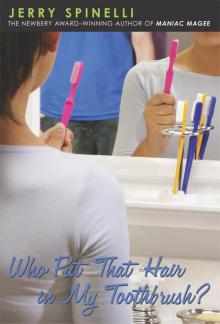 Who Put That Hair in My Toothbrush?
Who Put That Hair in My Toothbrush?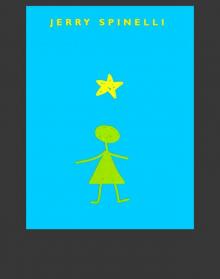 Stargirl
Stargirl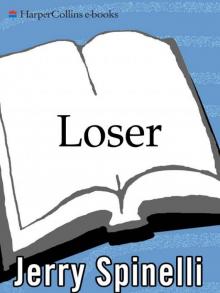 Loser
Loser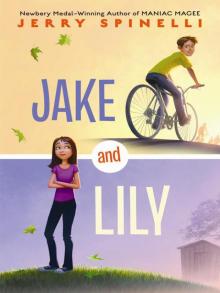 Jake and Lily
Jake and Lily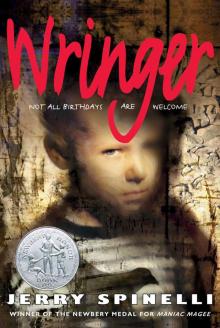 Wringer
Wringer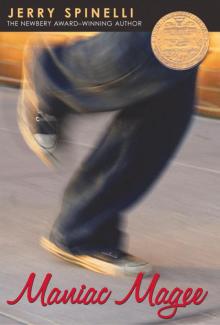 Maniac Magee
Maniac Magee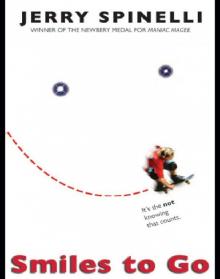 Smiles to Go
Smiles to Go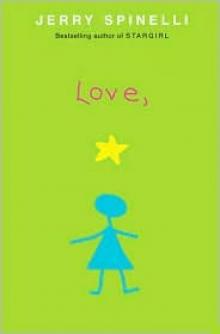 Love, Stargirl
Love, Stargirl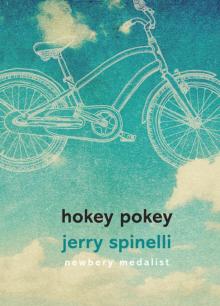 Hokey Pokey
Hokey Pokey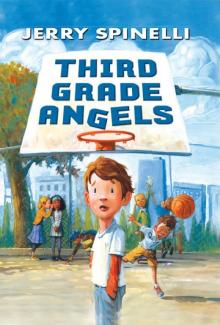 Third Grade Angels
Third Grade Angels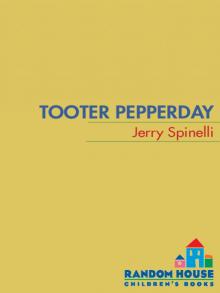 Tooter Pepperday: A Tooter Tale
Tooter Pepperday: A Tooter Tale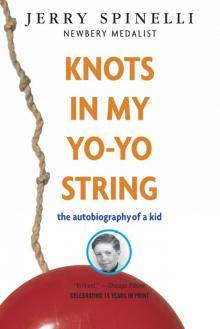 Knots in My Yo-Yo String Knots in My Yo-Yo String
Knots in My Yo-Yo String Knots in My Yo-Yo String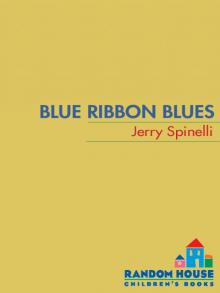 Blue Ribbon Blues: A Tooter Tale
Blue Ribbon Blues: A Tooter Tale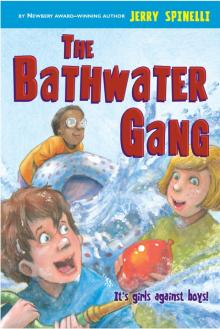 The Bathwater Gang
The Bathwater Gang Crash
Crash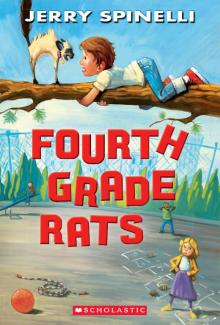 Fourth Grade Rats
Fourth Grade Rats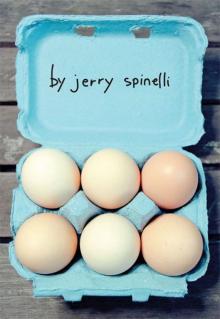 Eggs
Eggs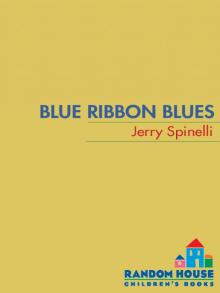 Blue Ribbon Blues
Blue Ribbon Blues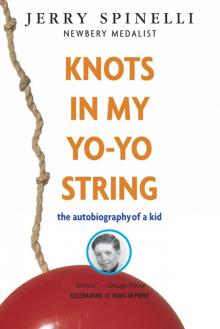 Knots in My Yo-Yo String
Knots in My Yo-Yo String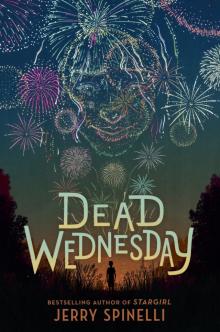 Dead Wednesday
Dead Wednesday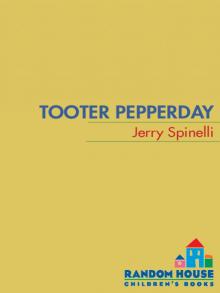 Tooter Pepperday
Tooter Pepperday